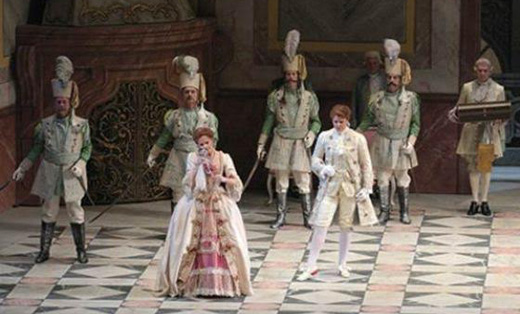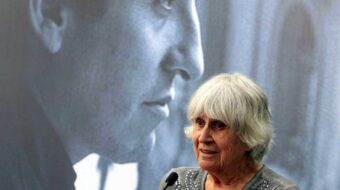
CHICAGO – Der Rosenkavalier – The Chevalier of the Rose – which premiered in Dresden in 1911, is Richard Strauss’s best known and most loved opera. Set in Vienna in the 1740s during the reign of the Austrian Empress Maria Theresa, it is, like most important works of art, to be interpreted as both a commentary on the time in which it is situated and on the era in which it is created. It is often staged in the Belle Epoque or Art Nouveau style of ca. 1900.
Rosenkavalier is a lusty comedy about class with strong elements of masquerade, sexual pursuit, cross-dressing and gender-bending, but with equally high moral purpose, especially in its reflections on sex, love, infatuation, romance, marriage – and their fleeting intersections. With a libretto by Hugo von Hofmannsthal, this fifth of Strauss’s many stage works is deemed their “Mozart opera” owing to resonances with The Marriage of Figaro. Both operas feature a critical role for a female singer (usually a mezzo) – Cherubino in Mozart, Octavian in Strauss – who plays a male character who then disguises himself as a young girl.
The plot revolves around Baron Ochs [ox] auf Lerchenau, a titled noble of boorish character and limited financial means, who claims he has “enough blue blood for two.” Marrying into the rising monied bourgeois class that owns property will bring him the income he lacks and his bride the title her father craves. At the same time, even if betrothed to the young virginal Sophie von Faninal, should that make a sexual lame duck of him? Hardly! On his engagement night he is already actively pursuing a young maid from the provinces. “It’s fun being the aggressor,” he proclaims.
Ochs is a cousin to the Feldmarschallin, Marie Thérèse, Princess Werdenberg, in her mid-30s, whom we meet in the opening scene in bed with her lover and relation, Octavian, Count Rofrano (the mezzo playing a trouser role), who is only 17. A large supporting cast of court sycophants, relatives, domestic workers and servants surround the quartet of principals in a complex exploration of the different kinds and stages of love. In the highly stratified society of Old Europe, any question about the nature of marriage raises issues of convenience, economics, age, status, “blood” and class position, love being reduced to almost the least consideration.
As the 18th century headed inexorably toward the French Revolution in 1789, the divine right of kings and the aristocracy came under attack. The brash young United States had already reintroduced to the world the classical concept of a republic of its citizens. Although monarchies and empires still reigned, noble rank declined in importance as the upstart European bourgeois made their fortunes in mills, mines, the slave trade, plantations, shipping, manufacturing, and later railroads.
Downton Abbey and the end of an era
These are perhaps the concerns more of thinkers at the beginning of the 20th century than the mid-18th, which is why we can say that Rosenkavalier is a product of its own time, and not principally of the 1740s. The anachronistic use of the waltz – not popular until the mid-19th century – is only one clue that Strauss and Hofmannsthal aimed for verities about the human condition that reflected their own era, transcending rather than capturing time. In their own lives, though they may not have been conscious of it, the great European empires were indeed on the verge of collapse.
The horror of World War I, which erupted only three years after Rosenkavalier‘s premiere, would spell the end of the various multi-national empires of Europe, the demise of ruling houses, the unforeseen rise of a socialist entity in Soviet Russia, the establishment of new national states in Central Europe in which people were citizens, not subjects. Strauss and Hofmannsthal may not have been able to predict the date for these developments, but surely – “sooner or later,” “today or tomorrow,” as the Marschallin wistfully muses about the loss of love – it would come.
One of the opera’s minor roles is that of Mohammed, the Marschallin’s black page (performed in Chicago by Zach Thomas), sporting an Arabic name and turban, reminding us that in 1911 a far-flung Ottoman Empire still abutted the great European powers. It would also, of course, shortly disappear without fanfare.
The popular British television phenomenon of Downton Abbey, set in exactly the era of Rosenkavalier‘s creation, also depicted the disappearance of one seemingly eternal way of life, and the emergence of new values, new ideas, new classes. Both of these works are a kind of wistful last kiss to empire. A telling moment comes at the end of Act I, when the Marschallin realizes, too late, that she never gave her lover a farewell kiss. Did she intuitively divine somehow that this had been her last chance? Do we ever truly recognize that evanescent moment when one era dissolves into another?
The British writer Osbert Sitwell, in his novel Those Were the Days, described the Rosenkavalier waltz as heard in the salons of London that fateful summer of 1914: “With its seductive rhythms, its carefully hidden cleverness, it was the last song of an era, and the fox-trots and tangos, of which the elder generation so much disapproved, always made way for it.”
Lyric Opera of Chicago uses a production originally designed for San Francisco Opera that seems, in its über-traditional sets and staging, a bit of a throwback today, now that audiences are used to innovative costume design, visuals and projections, and even some intentional anachronism in the opera house. The older audience I saw at the final performance of the season (March 13) suggests that a production with a fresher scenic approach might attract more new opera lovers.
But from the musical standpoint, Lyric Opera assembled a dream ensemble studded with accomplished artists. As the Marschallin, we saw the cool, regal, Illinois-born soprano Amanda Majeski, who, more than anyone I’ve ever seen in the role, asserted her amatory privilege. In her world she demands to be treated with discretion before the obvious fact that she is carrying on serial love affairs behind her husband’s back. Already assured of cooperation by her loyal footmen in barring uninvited intruders, she also binds her friends and relations to a tacit code of silence. Rank has its perks.
As Octavian, that chevalier of ambiguous sexuality, mezzo-soprano Alice Coote showed herself a supreme actor capable of assuming the randy excess of adolescent adoration, the stormy clouds of jealousy when Octavian fears the Marschallin may soon dump him, and the manner of a country bumpkin as the maidservant “Mariandel,” the lovestruck teenager meeting his true counterpart in Sophie, hardly able to name what hit him, and growing into a scheming plotter to save Sophie from Baron Ochs’ lascivious paws. The opera is aptly titled for this character, the centerpiece of the action.
Sophie is a well brought-up young girl who learned her convent school lessons well and is now excited to enter the “holy estate” of marriage arranged by her father. Once she meets her monstrous fiancé, however, she quickly learns to speak up for herself. Soon Sophie understands that marriage changes a man’s life far less than a woman’s. She was ravishingly sung by German soprano Christina Landshamer in her American operatic debut.
The sexually driven Baron Ochs is often portrayed as an older man befitting the role’s lyrical bass setting – perhaps in part because of the experience the part requires, those are the performers mostly available. I have seen him costumed as a bald roué with a generous gut. But in a pleasant departure, Lyric Opera offered the young British bass Matthew Rose in his Lyric Opera debut, returning the role to Strauss and Hofmannsthal’s original conception as a rustic lord, sleazy but nevertheless a “gentleman” in his mid-30s. In other words, the age difference between him and Sophie paralleled that between the Marschallin and Octavian. I appreciated the sense of equivalent naughtiness.
Many other roles in this large cast were handsomely performed, but alas too numerous to mention. Attentive details lit up the staging by Martina Weber. In the Marschallin’s morning levée, the reception she grants daily to various supplicants and merchants, an Italian singer (René Barbera) auditions for some future court appointment with a pseudo-antique love aria that is one of the jewels of the tenor repertoire, even though this character is on stage for not more than five minutes.
Edward Gardner, most recently the music director of London’s English National Opera, conducted with palpable affection for this luscious, swooning, mercurial and often raucous score.
In between Acts I and II Lyric Opera broke the fourth wall between stage and audience by leaving the curtain open for the scene change, showing the stagehands performing the invisible work of the theater, moving furniture, props and flies off and onto the stage. Just as the Art Nouveau style of Strauss and Hofmannsthal’s time at the turn of the 20th century would soon yield to the post-war functional Bauhaus esthetic, which reveals the heat and air ducts, the rafters and armature of the construction, we now see that the utilitarian effort of producing an opera is, besides anything else, also the livelihood of trained professional singers, dancers, actors and staging personnel – represented in this case by the International Alliance of Theatrical Stage Employees (IATSE Local 2) and the American Guild of Musical Artists, AFL-CIO (AGMA).

MOST POPULAR TODAY

High Court essentially bans demonstrations, freedom of assembly in Deep South

Zionist organizations leading campaign to stop ceasefire resolutions in D.C. area

U.S. imperialism’s ‘ironclad’ support for Israel increases fascist danger at home


UN warns that Israel is still blocking humanitarian aid to Gaza






Comments